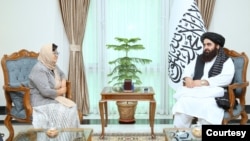The United Nations informed Taliban leaders Friday that it is working to finalize the agenda for a crucial two-day international conference on Afghanistan, and it is aiming for it to be accepted by all sides.
Roza Otunbayeva, the head of the U.N. Assistance Mission in Afghanistan, met with Taliban Foreign Minister Amir Khan Muttaqi in Kabul and discussed the matter, Muttaqi’s office said in a post-meeting statement.
The two sides “exchanged views on the detailed outlook and necessary coordination” for the June 30 U.N.-convened conference, which Doha, Qatar, will host.
The gathering, referred to as "Doha III,” will be the third in Qatar’s capital on the subject since U.N. Secretary-General Antonio Guterres initiated the process with special envoys on Afghanistan to promote an effective world approach to the Taliban-governed country, which is facing dire humanitarian, economic, and human rights crises.
“At the outset, Mrs. Roza Otunbayeva said that her team is working on the agenda of the 3rd Doha meeting and trying to arrange an agenda that could be recognized by all sides,” the Taliban foreign ministry stated.
While emphasizing the importance of a conference agenda “that may be acceptable to all sides,” Muttaqi was quoted as pledging "to work closely with the concerned sides regarding the matter.”
The U.N. did not immediately comment on its envoy’s meeting with the chief Taliban diplomat.
Otunbayeva’s contact with de facto authorities came amid growing calls for the U.N. to ensure Afghan women’s representation at the table in the Doha meeting, with the rights of women and girls at the center of discussions.
Rights activists have criticized the U.N. for inviting the Taliban to the Doha meeting and allegedly working hard to persuade them to attend the event. De facto Afghan authorities did not participate in the first two Doha gatherings, saying the U.N. had failed to meet their conditions for doing so.
The Taliban informally stated late last month their intention to join the June 30 discussions in Doha, however, promising to make a formal announcement after receiving from the U.N. the final agenda of the event.
On Thursday, about a dozen rights organizations, including Human Rights Watch and Amnesty International, jointly sent a letter to the U.N., the Security Council and member states, sharing concerns the Taliban’s participation in Doha is being sought at the cost of the rights of Afghan women and girls.
“While members of the international community are moving perilously close to accepting the legitimacy of Taliban rule, Afghanistan’s women, who are bravely fighting back and paying a devastating price as a result, are not,” the letter reads.
Heather Barr, women’s rights associate director at Human Rights Watch, told VOA the letter highlighted several concerns, including reports that women’s rights would neither be on the agenda nor fully represented at the conference.
“The situation in Afghanistan right now is already the most serious women’s rights crisis on the planet, and it is steadily worsening,” Barr stated. She criticized stepped-up U.N. contacts with the Taliban ahead of the Doha meeting.
“The context for this seems to be the U.N. twisting themselves into a pretzel to try to placate the Taliban and convince them to attend. That effort is in direct conflict with the U.N.’s core obligation to uphold human rights, including the rights of Afghan women and girls.”
U.N. officials have defended their invitation and engagement with the Taliban, saying that “they are the de facto authorities in Afghanistan” and underscoring that the world body is persistently urging Kabul to uphold the rights of women and girls.
The Taliban had asked the U.N. in the run-up to the second Doha meeting, in February, that their delegates would be accepted as the sole official representatives of the country, meaning that Afghan civil society representatives, women’s rights activists and members of opposition groups would not be present.
De facto Afghan authorities also sought a meeting between their delegation and the U.N. at “a very senior level,” saying it “would be beneficial” for both sides. The Taliban also opposed the planned appointment of a U.N. special envoy to coordinate international engagement with Kabul in line with the latest U.N. Security Council resolution on Afghanistan.
However, Guterres rejected the Taliban conditions, saying they would have “denied us the right to talk to other representatives of the Afghan society and demanded a treatment that would to a large extent be similar to recognition.”
No foreign country has recognized the Taliban as legitimate rulers of Afghanistan since they stormed back to power in August 2021 as all the U.S.-led NATO troops withdrew from the country after their two-decade-long presence.
The Taliban have imposed sweeping curbs on women’s right to education and public life at large in line with their strict interpretation of Islam. Afghan girls ages 12 and older are banned from attending secondary school, while women are prohibited from public and private workplaces, barring health care and a few other sectors.
Women are not allowed to undertake road trips unless accompanied by a close male relative and are banned from visiting parks, gyms and other public places.
The elusive Taliban supreme leader, Hibatullah Akhundzada, insists he is governing the country in line with local culture and Islamic teachings, rejecting international criticism of his policies as an interference in Afghanistan’s internal affairs.
The Taliban, who are ethnically Pashtun, have also dismissed international calls for giving representation to other Afghan ethnicities in the government, saying all groups are represented in it.





